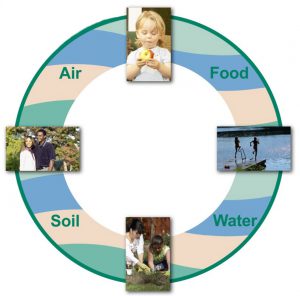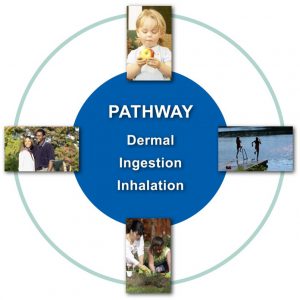How much do you know about environmental health?
Posted on byHow much do you know about environmental health?

We’re back for another round of testing your knowledge about environmental health!
By now, you probably realize that your environment can make you sick. Harmful exposures anywhere in your environment might affect your health. In the latest quiz, we saw that harmful exposures include more than exposures to toxins. Any exposure to hazardous substances or dangerous events in your environment can cause harmful health effects. Environmental public health is about protecting groups of people from environmental threats to their health, safety, and well-being.
Try to answer these questions.
- Some populations are at a higher risk of the effects of toxic substances than others. These populations include
- Young children
- Older adults
- Pregnant women
- All of the above
- A and B
- Everything is made of chemicals, so you come into contact with them every day. Which of these statements about chemical exposures is not true?
- Exposures to all sorts of chemicals are normal and frequent occurrences.
- Exposure to any amount of any chemical can harm your health.
- Frequency and length of exposure both play a role in determining whether you get sick from exposure.
- Chemicals in pesticides or herbicides can pollute soil, water, plants grown for food, and livestock.
- To get sick from exposure to an environmental contaminant, a certain amount of it must enter your body.
- Yes or No: The most common flood deaths occur when a vehicle is driven into hazardous floodwater.
- ATSDR supports cities and organizations that are reclaiming “brownfields.” What is a “brownfield” site?
- A meadow or pasture during winter
- Desert land with no irrigation
- An area with abandoned structures
- Contaminated area that must be cleaned up before re-use.
- Which of the following statements about asthma is false?
- Asthma causes wheezing, breathlessness, chest tightness, and nighttime or early morning coughing.
- Asthma cannot be controlled.
- You must remove the triggers in your environment that can make your asthma worse.
- If you have asthma, you have it all the time, but you will have asthma attacks only when something bothers your lungs.
- In most cases, we don’t know what causes asthma, and we don’t know how to cure it.

Environmental Public Health Quiz Answers
- Answer: D. All of the above.
- Children are especially vulnerable to environmental contaminants due to their rapid development from before they are born through early childhood.
- This means that when pregnant women are exposed, they are also exposing their unborn child to the substance.
- Young children are more at risk for contact with harmful substances because they have more contact with the ground and commonly put everything in their mouths.
- Older adults may be more at risk of chemical exposure because they may have weak immune systems, more sensitive lungs, chronic diseases, and age-related reactions to drugs.
- Answer: B is false.
- Chemical exposures can be harmful if they exceed certain limits. Also, a certain amount of a harmful chemical must enter your body to make you sick. Harmful chemicals can get into your body if you breathe, eat, or drink them or if they are absorbed through your skin.
- People respond to chemical exposures in different ways. Some people may come into contact with a chemical and never be harmed. Others may be more sensitive and get sick. Sometimes illness happens only if you are exposed to a harmful substance for a long time.
- Yes. Cars or other vehicles won’t protect you from floodwaters. They can be swept away or may stall in moving water. As little as six inches of water can cause you to lose control of your vehicle.
- Answer: D. Contaminated area that must be cleaned up before re-use.
- According to the Comprehensive Environmental Response, Compensation, and Liability Act (CERCLA) of 1980, the term “brownfield site” means real property, the expansion, redevelopment, or reuse of which may be complicated by the presence or potential presence of a hazardous substance, pollutant, or contaminant.
- ATSDR includes brownfields as a type of land reuse site. Land reuse sites are slated for redevelopment but may have chemical contamination.
- Answer: B. In most cases, we don’t know what causes asthma, and we don’t know how to cure it. However, asthma can be controlled by working with a healthcare professional, taking medication, avoiding asthma triggers, and removing triggers from your environment.
To learn more about each topic, please click on the corresponding link below.
Populations at higher risk of the effects of toxic substances.
Human Exposure to Environmental Chemicals
Floods
Brownfields
Asthma
Tweet this: “Environmental Public Health — how much do you know about? Take our quiz and find out. Go to https://bit.ly/2M1taO0”
2 comments on “How much do you know about environmental health?”
Comments listed below are posted by individuals not associated with CDC, unless otherwise stated. These comments do not represent the official views of CDC, and CDC does not guarantee that any information posted by individuals on this site is correct, and disclaims any liability for any loss or damage resulting from reliance on any such information. Read more about our comment policy ».


I had a brain aneurysm on October 6th I didn’t get released until October 24th I have two brain surgeries I have a 10 year old son play any money I have no or anything I was in the hospital for 4 weeks
I am living in a home infested with rats and 2 members of the household recently died after being taken to the hospital for shortness of breath and abdominal pain. Cause of death complete organ failure. The rodent problem was never brought to their attention so it is unknown weather or not it was related but now I am experiencing muscle aches and headaches and shortness of breath and I am concerned for the safety of my health but don’t know what to do about it.